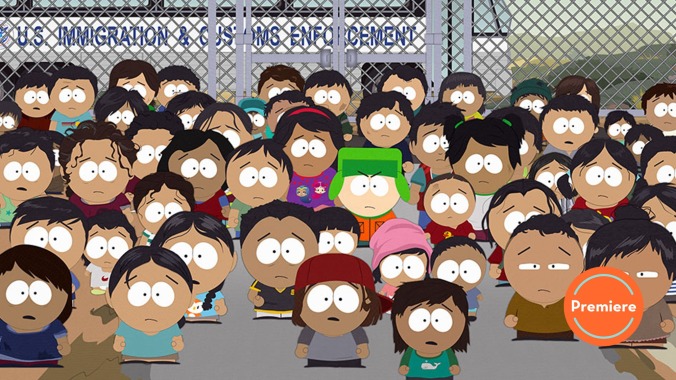We begin at Tegridy Farms, where Randy’s business has grown considerably after being embraced as an essential replacement for Amazon last season. Randy becomes nervous, however, when he notices that sales have gone down. He quickly realizes the problem; his customers have left him in lieu of growing their own weed. Incensed, he leads Stan on a crusade to get homegrown weed banned, citing the risk it poses to children. This is a clear reference to the recently proposed ban on flavored vape juices, and as Randy joins forces with Big Weed to make the ban happen, the show makes the point that many others have made; regardless of the actual danger proposed, companies like Philip Morris only support the ban because it helps their bottom line. This sets up a plotline that could be followed throughout the season: Randy’s newfound lust for cash, has compromised the, ahem, integrity that inspired him to go into the business in the first place.
Back in South Park, Cartman sees an El Salvadorian family taken away and separated from each other by ICE agents and comes to the most Cartman conclusion possible: “Well, this is nice.” Observing how easy it is to place a call to ICE, he makes an anonymous threat against Kyle’s family, and the Broflovskis are separated as well. With Kyle as the only white kid in an ICE detention camp, the guards quickly realize something is off, and when they find out he’s Jewish, they release him, rationalizing that keeping a Jewish child in one of these facilities could look… racist. Here, South Park answers the “Is it okay to call them concentration camps?” question that flummoxed the likes of Chris Hayes this summer in a typically irreverent fashion. The show manages to address the horror of the situation without being excessively heavy-handed, an impressive feat considering how full of clapter Trump-era comedy has been.
As much as a lot of this works, problems arise when the ICE plot is taken further. In an attempt to get the ICE guards to realize the harm their cruelty could do, Kyle notes that all superhero film villains have tragic origin stories, and suggests that one of these children could one day vow revenge and become the titular Mexican Joker. In typical South Park fashion, the guards miss Kyle’s point entirely, doing everything from putting on puppet shows to performing dangerous shock therapies on children to prevent this from happening. This is where things get a bit tricky; the guards are rather casual about the vileness of their actions. What they’re doing is obviously wrong, but they don’t seem to act with much malice, with their ultimate goal just being to cover their asses. It’s difficult to say if we’re supposed to view them as virulent racists who firmly believe what they’re doing is the right thing, to the point where they’ve become numb to it, or if they truly believe they’re just Doing Their Job and haven’t considered the morality of the situation beyond that. Assuming the detention center will be making a return in future episodes, I’d like to see the guards’ motivations fleshed out a bit more.
The plots become connected when Randy’s paranoia over homegrown weed costing him his fortune makes him go insane, and he starts acting like, you guessed it, The Joker. Referencing The Dark Knight, Randy blows up every marijuana garden in town, re-establishing himself as the town’s only source. When the FBI gets wind of this, they naturally cast the blame on Kyle’s Mexican Joker archetype. Meanwhile, Kyle attempts to free all the children by converting them to Judaism, granting them the same immunity he has. It almost works, but in a confusing scene where the guards think they’re in a superhero film-style flashback, Kyle angrily tells them that the Mexican Joker doesn’t exist, so they assume they’re in the wrong flashback, and just leave the kids there. I get that this scene is trying to parody the flawed logic of these films, but it left us with an awkward, unsatisfying ending.
“Mexican Joker” has some good gags, and gets in some solid shots at the horror of Trump’s immigration policies, as well as the naked opportunism of Big Tobacco supporting the flavored vape ban. That being said, the episode ultimately tries to do too much at once, and feels awkward and disjointed. In previous serialized seasons, the show eased its way into each thread, often introducing them one episode at a time before resolving them all during the final stretch. Here, they already have enough going on to satisfy an entire season’s worth of storylines. Based on Trey and Matt’s history, we can be confident that they will ultimately provide satisfying answers to all the questions they’ve created. But in the case of this individual episode, it felt a bit rushed and unfinished. The best hope for “Mexican Joker” is that when all is said and done, it will look better in the context of a fully realized story.
Stray observations
- “I hate watchin’ babies drown! Seems like a waste of baby.”
- The theme song and opening are replaced with a new one centered around Tegridy Farms. I’m curious to see if they’ll use this all season.
- I’m glad to see we’ll get a second season of Tegridy Farms. With Randy’s dark turn here, I wonder if it’ll be a bit like the two-season-long Cartman-Heidi relationship, where a bright new development for a character is brought down by their worst tendencies.

